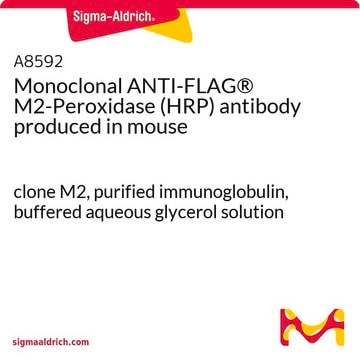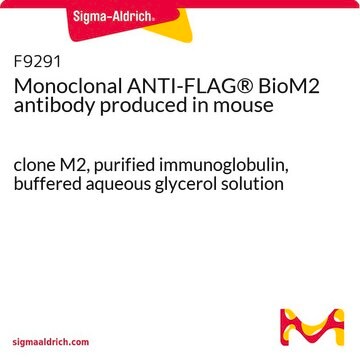Wichtige Dokumente
H7425
Anti-FLAG®-Peroxidase antibody produced in rabbit
IgG fraction of antiserum
Synonym(e):
Anti-FLAG-HRP Polyclonal Conjugate
About This Item
Empfohlene Produkte
Qualitätsniveau
Beschreibung
buffered aqueous solution
Form
lyophilized solid
Methode(n)
western blot: 1:2000-1:4000 using for detection of amino-terminal FLAG-BAP fusion protein in an E. coli crude cell lysate
Versandbedingung
dry ice
Lagertemp.
−20°C
Allgemeine Beschreibung
ANTI-FLAG recognizes the FLAG epitope located on FLAG fusion proteins. The antibody reacts with N-terminal, N-terminal-Met, and C-terminal FLAG fusion proteins by immunoblotting. Specific staining is inhibited by the FLAG peptide (N-Asp-Tyr-Lys-Asp-AspAsp-Asp-Lys-C). Applications for the conjugate include Western blots and ELISA.
Epitope tags provide a method to localize gene products in a variety of cell types, study the topology of proteins and protein complexes, identify associated proteins, and characterize newly identified, low abundance, or poorly immunogenic proteins when protein specific antibodies are not available. Tagging with the FLAG peptide sequence may be done at the N-terminus, N-terminus preceded by a methionine residue, C-terminus, or at internal positions of the target protein. FLAG may also be placed in association with other tags. The small size of the FLAG tag or sequence and its high hydrophilicity tend to decrease the possibility of interference with the protein expression, proteolytic maturation, antigenicity, and function. The N-terminal FLAG peptide sequence contains a unique enterokinase cleavage site allowing it to be completely removed from the purified fusion proteins. Cleavage catalyzed by Cu2+ ions of the C-terminal FLAG peptide from a fusion protein has been reported. A sequence motif with five out of eight amino acid residues identical to the FLAG peptide is found in both rat and mouse Mg2+ dependent protein β-phosphatase, as well as in the human and bovine enzyme.
Immunogen
Anwendung
Browse additional application references in our FLAG® Literature FLAG® Literature portal.
Physikalische Form
Rechtliche Hinweise
Haftungsausschluss
Signalwort
Danger
H-Sätze
Gefahreneinstufungen
Aquatic Chronic 3 - Eye Irrit. 2 - Resp. Sens. 1 - Skin Irrit. 2 - Skin Sens. 1
Lagerklassenschlüssel
11 - Combustible Solids
WGK
WGK 3
Hier finden Sie alle aktuellen Versionen:
Analysenzertifikate (COA)
Die passende Version wird nicht angezeigt?
Wenn Sie eine bestimmte Version benötigen, können Sie anhand der Lot- oder Chargennummer nach einem spezifischen Zertifikat suchen.
Besitzen Sie dieses Produkt bereits?
In der Dokumentenbibliothek finden Sie die Dokumentation zu den Produkten, die Sie kürzlich erworben haben.
Unser Team von Wissenschaftlern verfügt über Erfahrung in allen Forschungsbereichen einschließlich Life Science, Materialwissenschaften, chemischer Synthese, Chromatographie, Analytik und vielen mehr..
Setzen Sie sich mit dem technischen Dienst in Verbindung.









